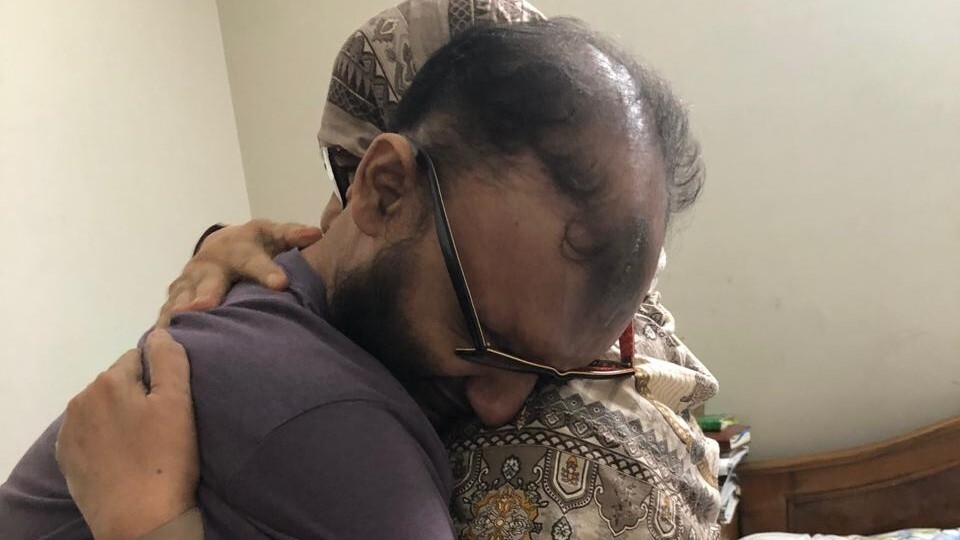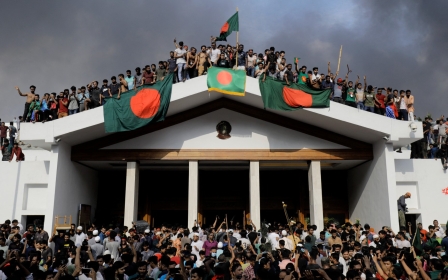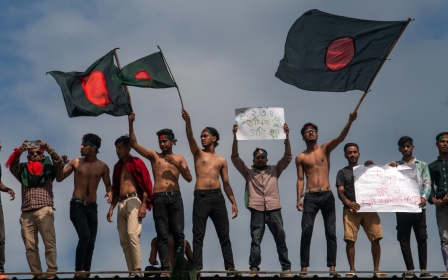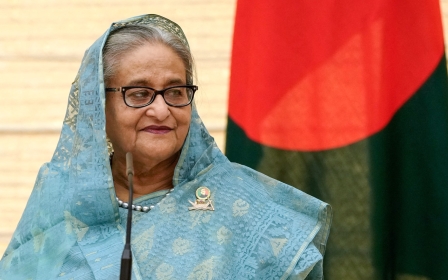Bangladesh: Barrister abducted eight years ago reemerges a day after Sheikh Hasina flees

A Bangladeshi barrister who was forcibly disappeared eight years ago was reunited with his family early on Tuesday, less than 24 hours after Sheikh Hasina tendered her resignation as prime minister and fled the country.
Mir Ahmad bin Quasem Arman, also known as Mir Arman, could be seen embracing his mother and two daughters in pictures shared on social media, a day after the Bangladeshi army ordered his release.
According to the pictures, Arman looked like a shell of his former self, having lost considerable weight whilst in captivity.
Still, Michael Polak, a barrister based in London who represented Arman's family and advocated for his release, said he was "overjoyed" at the news and delighted to see his client reunited with his loved ones.
"Arman was detained in secret for eight years and we tried everything to get him released and at times it felt hopeless," Polak told Middle East Eye.
New MEE newsletter: Jerusalem Dispatch
Sign up to get the latest insights and analysis on Israel-Palestine, alongside Turkey Unpacked and other MEE newsletters
"Unlike other countries like Iran, where you could speak to your client, we were not afforded that opportunity because the Bangladeshis denied they were holding him and claimed he had fled the country."
Alhamdulillah! Barrister Mir Ahmad Bin Quasem Arman has been released from the Aynaghar (secret detention centre run by DGFI). pic.twitter.com/fmmn5LfVAk
— Nznn Ahmed (@na_nznn) August 6, 2024
The son of Mir Quassem Ali, a leader from Jamaat-e-Islami, the main Islamist party in Bangladesh, Arman served on his father's legal team before he was convicted and executed in September 2016 by Bangladesh's controversial International Crimes Tribunal for crimes committed during the 1971 war of independence.
Weeks before his father's execution, Arman was seized from his home by plain-clothed officers from the Directorate General of Forces Intelligence (DGFI), Bangladesh's notorious military intelligence agency, in front of his mother and two young daughters.
Arman's family was never told where he was being held or whether he was alive, but activists believed the lawyer was being kept in Aynaghar, a secret prison run by the DGFI where other political opponents are believed to have been held.
Toby Cadman, a barrister who represented Arman's father, said his release sent "a clear signal" that the "detention in a secret location was, and at the very least, within her (Hasina's) knowledge."
"After claiming for years that they were not being held by her government, within hours of the collapse of her government, they were released," Cadman told MEE.
"It is difficult to draw any other conclusion.
"It is clear that hundreds of persons have disappeared. Many have lost their lives, but many still remain in secret locations. They will all have to be released and those responsible held accountable," he added.
During his detention, Arman's family had made several requests to the Bangladeshi government to seek information about his whereabouts, but they repeatedly denied holding him.
Arman's mother also wrote letters to Tulip Siddiq, the Labour MP for Hampstead and Highgate and niece of Hasina. According to the family, she never responded.
In 2022, Bangladesh's Home Minister Asaduzzaman Khan dismissed concerns over missing opposition activists and said that those who went missing might be in hiding.
According to Bangladeshi human rights monitors, there have been at least 600 enforced disappearances since 2009. While some activists or government critics were later released, produced in court, or said to have died during an armed exchange - nearly 100 remained missing.
Earlier on Tuesday, senior UN officials and the head of Mayar Dak, a group representing the families of Bangladesh's disappeared, met with military intelligence officials from the DGFI to demand the release of their relatives.
MEE reached out to the Bangladeshi army for comment but did not receive a response by the time of publication.
Middle East Eye delivers independent and unrivalled coverage and analysis of the Middle East, North Africa and beyond. To learn more about republishing this content and the associated fees, please fill out this form. More about MEE can be found here.




